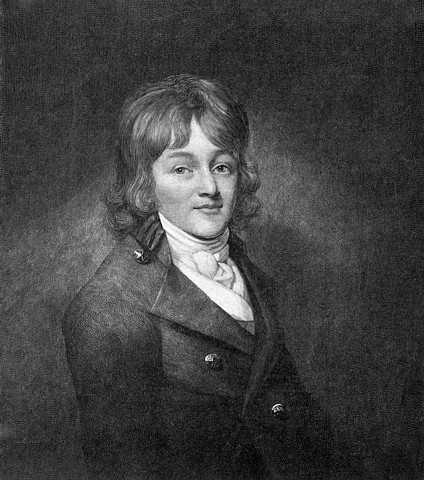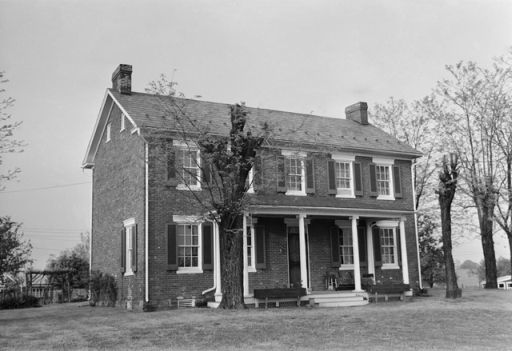Francis Scott Key

(1779-1843)

Eugene L. Didier, The Golden Days of the Maryland
Bar
3 Green Bag 312, at 316 (1891)
"FRANCIS SCOTT KEY was
born in Frederick County, Maryland, August 1, 1779. His father,
John Ross Key, an officer in the army in the Revolutionary war,
was a descendant from some of the earliest settlers of the province.
The son was educated at St. John's College, Annapolis,
and, after completing his course, studied law with his uncle, Philip
B[arton] Key, at Annapolis, and, in 1801, commenced the practice
of the profession at Fredericktown, in his native county. Some years
after he removed to Washington [D.C.], where he became District
Attorney of the city, and there remained until his death, January
11, 1843.
Mr. Key was the author, in addition to the Star-Spangled
Banner, of a few other songs and devotional pieces. His poems were
written without any view to publication, on some passing topic for
his own and the gratification of his friends. They were noted down
on odd scraps of appear, backs of letters, &c., a piece of several
verses being often on as many separate slips of paper, and were
seldom revised by the author." [Evert A. &
George L. Duyckinck, 1 The Cyclopedia of American Literature
692 (Philadelphia: William Rutter & Co., 1880)(2 vols.)]
Key died in 1843. His poetry was collected and edited,
after his death by Chief
Justice Roger B. Taney.
The
Star-Spangled Banner.
"This Song was written by Francis Scott Key, of Baltimore,
September 14, 1814. After burning Washington, the British advance
towards Baltimore, and were met by a smaller number of Americans,
most of whom were captured and taken to the large fleet, then preparing
to attack Fort McHenry. Among the prisoners was a Dr. Beames, an
intimate friend of Mr. Key. Hoping to intercede for the doctor's
release, Mr. Key, with a flag of truce, started in a sail-boat for
the admiral's vessel. Here he was detained in his boat, moored from
the stern of the flag-ship, during the terrible bombardment of twenty-five
hours, and at last, seeing the "Star-spangled Banner"
still waving, he seized an old letter from his pocket, and on a
barrel-head, wrote the following stanzas:
I.
Oh! say, can you see by the dawn's early light,
What so proudly we hail'd at the
twilight's last gleaming,
Whose broad stripes and bright stars thro' the perilous fight,
O'er the ramparts we watch'd, were
so gallantly streaming;
And the rocket's red glare, the bombs bursting in air,
Gave proof through the night that our flag was still there.
Oh! say, does that star-spangled banner yet wave,
O'er the land of the free and the home of the brave!
II.
On the shore dimly seen thro' the mist of the deep,
Where the foe's haughty host in
dread silence reposes,
Where is that which the breeze, o'er the towering steep,
As it fitfully blows, half conceals,
half disclose?
Now it catches, the gleam of the morning's first beam,
In full glory reflected, now shines in the stream:
'Tis the star-spangled banner, Oh! long may it wave,
O'er the land of the free and the home of the brave!"
[Source: S.B. McCracken (ed.), Michigan
and the Centennial; Being a Memorial Record Appropriate to the Centennia
Year 48 (Detroit, 1876)]
Song
When the warrior returns from the battle afar,
To the home and the country he nobly defended,
Oh! warm be the welcome to gladden his ear,
And loud be the joy that his perils are ended.
In the full tide o. song let his name roll along,
To the feast flowing board let us gratefully throng,
Where mixed with the olive the laurel shall wave,
And form a bright wreath for the brows of the brave.
Columbians! a band of thy brothers behold,
Who claim the reward of thy hearts' warm emotion,
When thy cause, when thine honor urged onward the bold,
In vain frowned the desert, in vain raged the ocean.
To a far distant shore, to the battle's wild roar,
They rushed, thy fair fame and thy rights to secure;
Then mixed with the olive the laurel shall wave,
And form a bright wreath for the brows of the brave.
In the conflict resistless each toil they endured,
'Till their foes fled dismayed from the war's desolation;
And pale beamed the crescent, its splendor obscured
By the light of the star-spangled flag of our nation.
Where each radiant star gleamed a meteor of war,
And the turbaned heads bowed to its terrible glare,
Now mixed with the olive the laurel shall wave,
And form a bright wreath for the brow of the brave.
Our fathers who stand on the summit of fame,
Shall exultantly hear of their sons the proud story,
How their young bosoms glowed with the patriot flame,
How they fought, how they fell, in the blaze of their glory.
How triumphant they rode o'er the wondering flood,
And stained the blue waters with Infidel blood;
How mixed with the olive the laurel did wave,
And, formed a bright wreath for the brows of the brave.
Then welcome the warrior returned from afar
To the home and the country he nobly defended,
Let the thanks due to valor now gladden his car,
And loud be the joys that his perils are ended.
In the full tide of song let his fame roll along,
To the feast flowing board let us gratefully throng,
Where mixed with the olive the laurel shall wave,
And form a bright, wreath for the brows of the bravo.
[Evert A. & George L. Duyckinck, The Cyclopedia
of American Literature 692 (Philadelphia: William Rutter &
Co., 1880)(vol. 1)]

Francis Scott Key
Wikipedia
Francis Scott Key
Appleton's Cyclopedia of American Biography
(New York: D. Appleton and Company, 1887-1889)(James Grant Wilson & John Fiske eds.)(6 vols.)
Francis Scott Key
The National Cyclopaedia of American Biography
Francis Scott Key
The Poets and Poetry of America
Francis
Scott Key
United State Flag Page
Francis
Scott Key
Columbia Encyclopedia (6th ed., 2001)
Francis
Scott Key (1779-1843)
Francis
Scott Key
The
Star-Spangled Banner
Star-Spangled
Banner and the War of 1812
Star-Spangled Banner
Wikipedia
The Star-Spangled Banner
The
Star-Spangled Banner
The
Star-Spangled Banner
The
Star-Spangled Banner

Poetry
Francis Scott Key, Poems of the Late Francis S.
Key, Esq. (New York: Robert Carter & Brothers, 1857)(introductory
letter by Chief Justice Taney) [online text]
Writings
Francis Scott Key, The Power of Literature and
Its Connexion with Religion (Bristol, Pennsylvania: Bristol
College Press, 1834)("an oration, delivered at Bristol College,
July 23, 1834, before The Philologian Society")
Bibliography
Edward S. Delaplaine, Francis Scott Key, Life
and Times (Brooklyn, New York: Biography Press, 1937)
F. S. Key-Smith, Francis Scott Key, Author of
the Star Spangled Banner: What Else He Was and Who (Washington,
D.C.: Key-Smith and Company, 1911)
Sam Meyer, Paradoxes of Fame: The Francis Scott
Key Story (Annapolis, Maryland: Eastwind Publications, 1995)
Lillie Patterson & Victor Dowd, Francis Scott
Key, Poet and Patriot (Champaign, Illinois: Garrard Pub. Co.
1963)
John T. Silkett, Francis Scott Key and the History
of the Star Spangled Banner (Washington: Vintage America Publishing
Co., 1978)
H. Ray Youngberg, Ancestors & Descendants of Francis
Scott Key, Lawyer & Poet (Wilmington, North Carolina: Youngberg,
1998)
Victor Weybright, Spangled Banner: The Story of
Francis Scott Key (New York: Farrar & Rinehart, 1935)
Bibliography: Articles
John T. Noonan, Lights of the Law: Madison, Key, Jackson,
69 (4) Anglican and Episcopal History 410-420 (2000)
Sam Meyer, Religion, Patriotism, and Poetry in the
Life of Francis Scott Key, 84 (3) Maryland Historical Magazine 267-274
(1989)
Scottie Fitzgerald Smith, The Colonial Ancestors of
Francis Scott Key, 76 (4) Maryland Historical Magazine 363-375 (1981)
Frank L. Owsley, Jr., Francis Scott Key's Mission
to Alabama in 1833, 23 (3) Alabama Review 181-192 (1970)
Jacob Blanck, The Star Spangled Banner, 60 (2) Papers
of the Bibliographical Society of America 176-184 (1966)
Eugene L. Didier, Francis Scott Key as a Lawyer, 16 (5) The Green Bag 293 (1904)

Terra Ruba
Birthplace of Francis Scott Key, composer of the National Anthem,
near Taneytown, Maryland, off Route 71
Research
Key, Cutts, and Turner Family Papers
Albert and Shirley Small Speical Collections Library
University of Virginia
Charlottesville, Virginia
|



